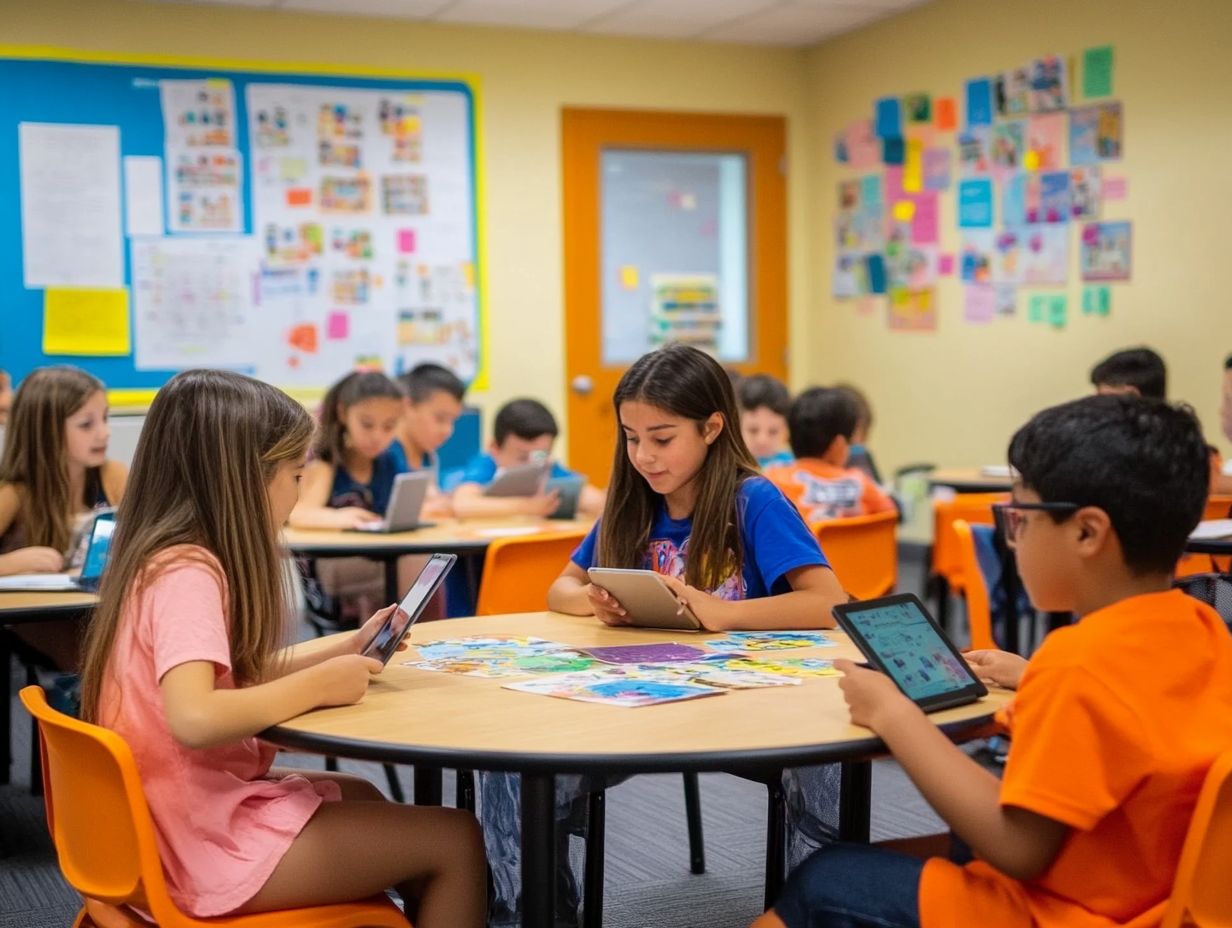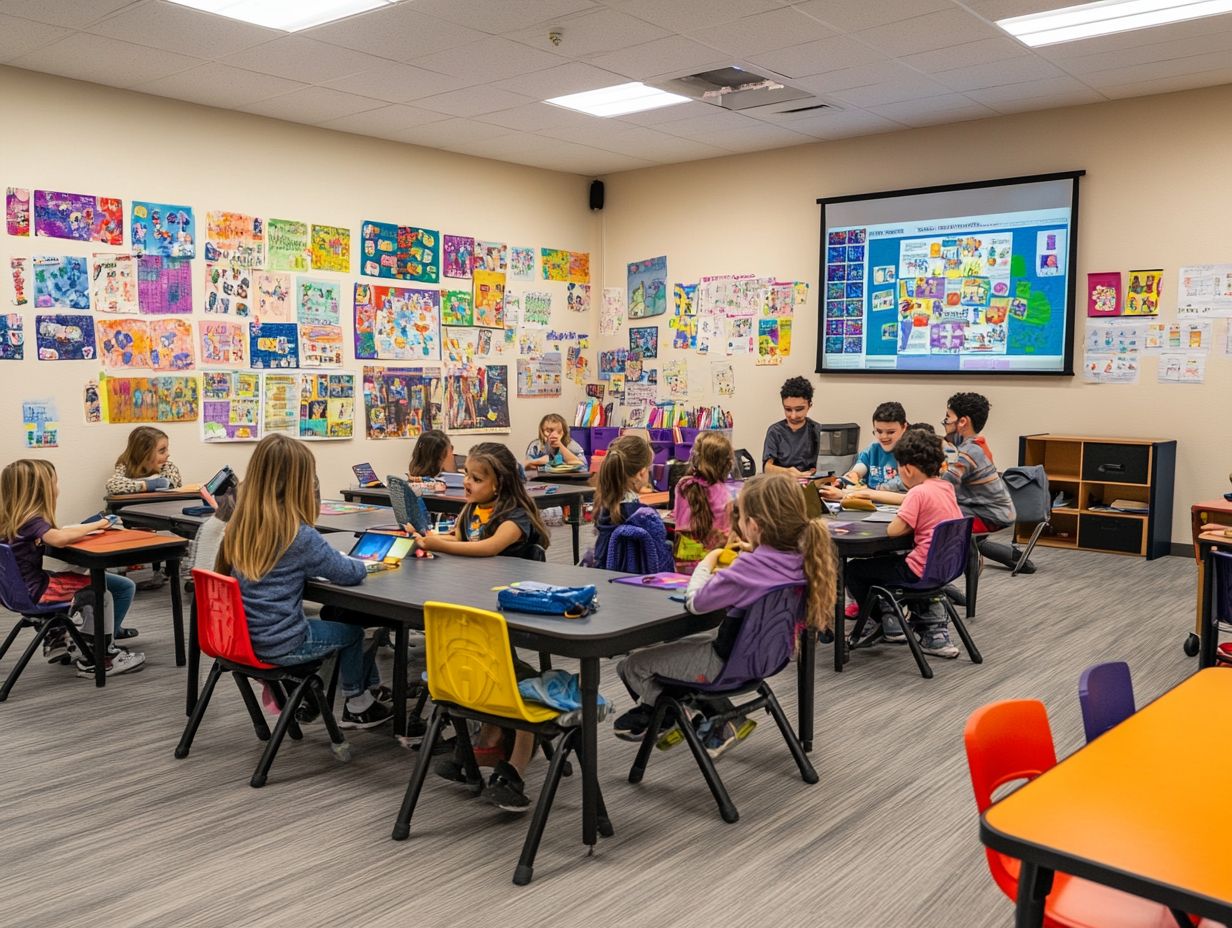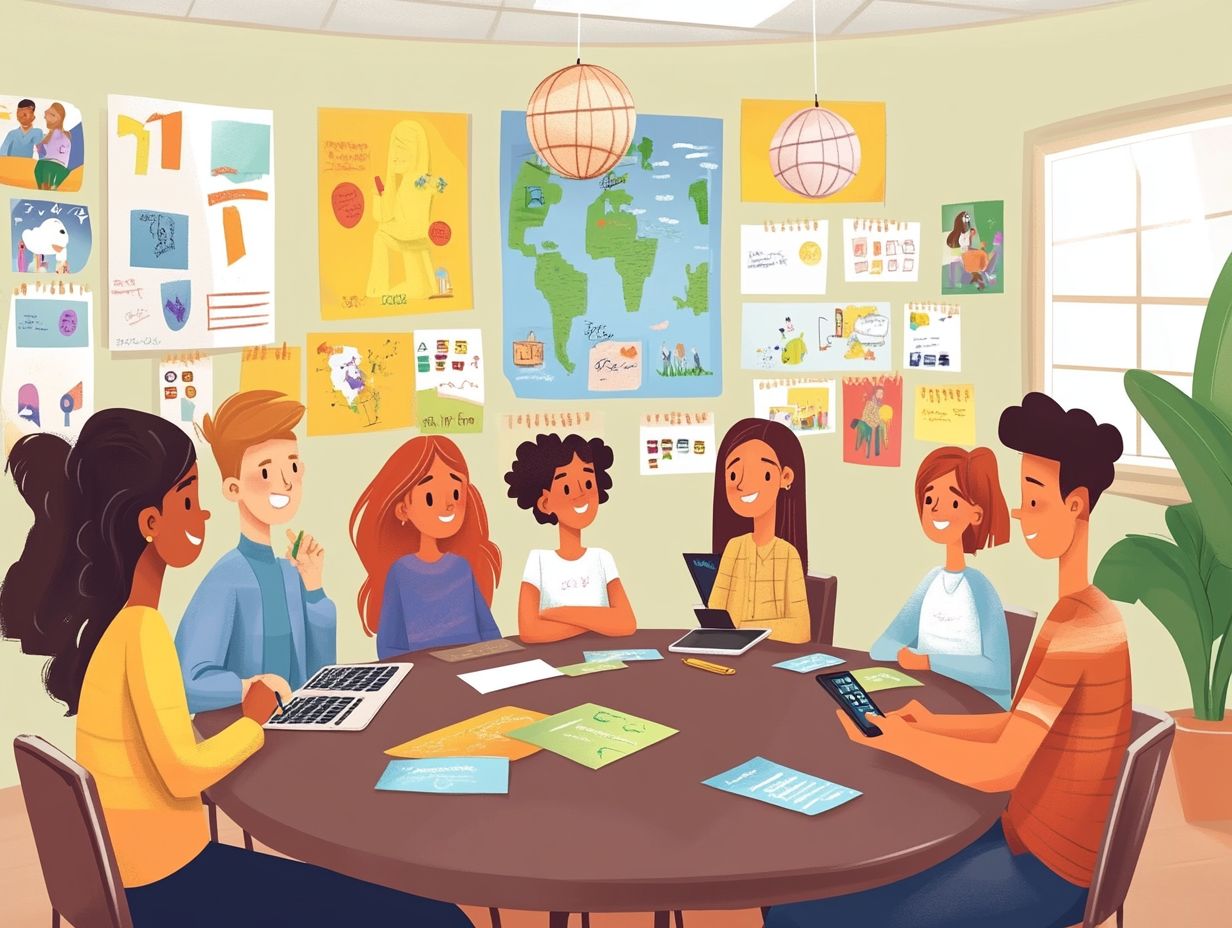7 ways to make language learning fun
Learning a new language might seem daunting, but it doesn’t have to be! This article shares seven engaging ways to make language learning enjoyable and effective.
Whether through games, movies, music, or conversations with native speakers, there are many ways to enhance your skills and keep your motivation high. Discover how to weave language learning into your daily routine while avoiding common pitfalls.
Dive in and uncover the exciting side of language learning!
Contents
- Key Takeaways:
- 1. Incorporate Games and Activities
- 2. Watch Movies and TV Shows in the Target Language
- 3. Use Music and Songs
- 4. Engage in Conversation with Native Speakers
- 5. Take a Trip to a Country Where the Language Is Spoken
- 6. Use Language Learning Apps and Online Resources
- 7. Join a Language Learning Community or Group
- How Does Making Language Learning Fun Help with Retention?
- What Are the Benefits of Learning a Language through Fun Activities?
- How Can One Stay Motivated to Continue Learning in a Fun Way?
- What Are Some Fun and Creative Ways to Practice Speaking and Writing?
- How Can Language Learning Be Incorporated into Everyday Activities?
- What Are Some Common Mistakes to Avoid When Trying to Make Language Learning Fun?
- Frequently Asked Questions
- 1. How can I make language learning fun?
- 2. Can I make language learning fun even if I don’t like studying?
- 3. How can I use technology to make language learning more enjoyable?
- 4. Is it possible to make language learning fun for children?
- 5. How can I make language learning fun without spending a lot of money?
- 6. Can I make language learning fun if I am learning on my own?
Key Takeaways:

Games and activities can make learning more fun.
Watching movies can boost your listening skills.
Music helps with memorization and makes vocabulary and grammar enjoyable.
1. Incorporate Games and Activities
Games and activities can transform tedious vocabulary memorization into an enjoyable journey. Explore various games for immersive language experiences that are both fun and interactive.
Online games present real-time challenges that boost your confidence. Traditional games like French Scrabble provide tactile experiences that improve spelling skills.
Apps that use games, like Mondly, offer quizzes and lessons that enhance learning enjoyment. These methods encourage interaction and help you build conversational skills in a supportive environment.
2. Watch Movies and TV Shows in the Target Language
Watching movies and TV shows in your target language provides a wealth of cultural references. This approach sharpens your language skills while exposing you to native pronunciation and dialects.
As you immerse yourself in gripping narratives, you naturally expand your vocabulary and comprehension. Choosing content that matches your interests keeps you motivated on your learning journey.
3. Use Music and Songs
Incorporating music into your language study turns it from a chore into a delight. The rhythm and melody help you memorize vocabulary and improve pronunciation.
By listening to popular songs, you grasp idioms and slang naturally. Genres like reggae and pop connect you with cultural themes and social issues.
Attending live performances or festivals provides real-world practice in a dynamic setting. It s about experiencing culture in all its vibrant forms.
4. Engage in Conversation with Native Speakers
Engaging in conversation with native speakers is crucial for learning a new language. It also helps you build connections in your community and gain real-world insights.
To find suitable language partners, explore various social media platforms, such as:
- Facebook groups dedicated to language learning.
- Twitter hashtags that link you with like-minded individuals.
Reddit has great language exchange groups where you can post requests for partners or respond to existing threads. Regular participation in conversations sharpens your grammar and vocabulary.
These interactions create a supportive environment where mistakes turn into valuable learning opportunities. This makes your journey toward fluency enjoyable and less intimidating.
5. Take a Trip to a Country Where the Language Is Spoken

Taking a trip to a country where your target language is spoken immerses you in an authentic environment. This offers an unparalleled opportunity to dive into cultural references, savor foreign dishes, and embrace local customs while honing your language skills.
This vibrant setting invites you to step away from textbooks and into real-life conversations. You ll gain a deeper understanding of phrases, idioms, and nuances that often elude traditional classroom lessons.
Engaging in spontaneous dialogues at markets or cafes can significantly enhance your vocabulary retention, keeping new words in your memory for longer.
Participate in local cultural events to enhance your experience and expose yourself to regional dialects and traditions.
Savoring local cuisine tantalizes your taste buds and opens up discussions about culinary terminology and food culture, making language learning memorable and relevant.
6. Use Language Learning Apps and Online Resources
Utilizing language learning apps and online resources can significantly elevate your learning journey. These tools provide structured pathways and interactive features tailored to various learning styles.
For example, Mondly makes learning fun through games, allowing you to engage with enjoyable quizzes and practice conversations in context.
Incorporating online resources like podcasts and YouTube channels can further enrich your experience. Listening to podcasts in your target language immerses you in authentic speech patterns and everyday vocabulary.
YouTube videos bring the language to life with captivating visuals, fostering an engaging and flexible environment for building your vocabulary.
7. Join a Language Learning Community or Group
Joining a language learning community or group can truly elevate your experience. It creates a sense of belonging while offering a platform to share resources, experiences, and positive feedback.
Engaging with like-minded individuals through various channels think Reddit communities, specialized social media groups, and local meetups opens up invaluable opportunities for practice and interaction.
By participating in discussions, you gain insights into different cultures and receive real-time support from peers. These connections are vital for maintaining motivation and developing practical conversation skills.
The friendships and networks you cultivate within these communities often lead to increased accountability and enjoyment, both of which are essential for mastering a new language.
How Does Making Language Learning Fun Help with Retention?
Making language learning enjoyable is essential for retention. When you engage in fun activities and adopt a playful learning style, you form a positive emotional connection to the material. This connection enhances your ability to recall and understand language concepts more effectively.
When you participate in playful interactions, like games or immersive experiences, you re more likely to stay focused and motivated throughout the learning process. This increased engagement is critical for effective learning, as it deepens your understanding of the subject matter.
By weaving enjoyment into education, the anxiety typically associated with learning a new language fades away. It s fascinating how psychological aspects come into play: motivation sparked by fun activities boosts your confidence and inspires you to pursue your goals with greater enthusiasm, setting the stage for lasting mastery!
What Are the Benefits of Learning a Language through Fun Activities?
Learning a language through enjoyable activities offers numerous benefits, such as heightened engagement, improved retention, and a chance to connect with a community all of which enhance the language acquisition process.
This approach cultivates greater motivation within you. The fun derived from interactive experiences significantly alleviates anxiety often linked to traditional methods.
For instance, when you participate in language-themed games or immerse yourself in role-playing scenarios, you practice your skills in a relaxed setting. This encourages you to experiment freely, without the fear of failure.
Engaging in group cooking classes or collaborating on art projects not only aids in your language practice but also fosters a supportive learning environment where you feel valued and understood. This creates pathways to lasting friendships and invites further cultural exploration!
How Can One Stay Motivated to Continue Learning in a Fun Way?

Staying motivated to continue your language-learning journey in an enjoyable way involves pinpointing what truly inspires you. Weaving those elements into a routine keeps the process fresh and engaging.
A highly effective strategy is to set achievable learning goals that offer you a clear sense of direction. For example, aiming to learn five new vocabulary words each week instills a sense of progress that s both satisfying and motivating!
Diverse activities like watching films in your target language, participating in conversation clubs, or using language apps add variety and keep your interest alive. Celebrating small victories, such as mastering tricky pronunciation or completing a language challenge, reinforces your dedication and sparks enthusiasm!
This approach transforms your learning journey into an experience that is productive and genuinely enjoyable.
What Are Some Fun and Creative Ways to Practice Speaking and Writing?
Exploring fun and creative ways to practice speaking and writing can significantly enhance your language learning experience. Engaging activities make it more vivid and effective.
One enjoyable method is to keep a diary where you express your thoughts in your target language. This encourages both reflection and self-expression.
You can take this a step further with interactive writing prompts that inspire imaginative storytelling or dialogue creation, fostering your creativity.
Incorporating language memes adds humor while enhancing your vocabulary in a relatable context. This makes the learning process truly enjoyable!
These approaches not only lighten the atmosphere but also offer countless opportunities to immerse yourself in practical usage, solidifying your skills while having a great time.
How Can Language Learning Be Incorporated into Everyday Activities?
Incorporating language learning into your everyday activities transforms the mundane into an immersive experience. This approach allows you to develop language skills naturally within your daily routines.
Imagine cooking as a delightful adventure, where you follow recipes from cooking blogs written in your target language. You will learn culinary terms and soak up cultural nuances along the way.
Watching foreign films offers another engaging avenue to enhance your listening skills. It immerses you in authentic dialogues and societal contexts that enrich your understanding. Diving into language articles be it travel tips or current events further solidifies your vocabulary and comprehension, making learning feel seamless.
These simple yet impactful methods encourage you to connect linguistically with your environment. You can broaden your cultural horizons, turning every moment into an opportunity for growth.
What Are Some Common Mistakes to Avoid When Trying to Make Language Learning Fun?
When you set out to make language learning enjoyable, it s crucial to steer clear of common pitfalls that could impede your progress. Avoid leaning too heavily on traditional methods or neglecting to align activities with your personal interests and learning objectives.
If these issues go unaddressed, you might find yourself ensnared in a monotonous routine that saps your enthusiasm. A lack of variety in your learning methods can lead to boredom, causing you to lose motivation and potentially abandon your journey altogether.
To counteract this, consider incorporating playful activities like games, interactive storytelling, or joining language exchange meetups. These approaches can greatly improve your experience.
Setting specific, achievable goals that resonate with your passions not only ignites excitement but also infuses the process with meaning. By remaining flexible and open to exploring new strategies, you can cultivate a rich and rewarding journey in language acquisition.
Frequently Asked Questions
1. How can I make language learning fun?

There are various ways to make language learning fun. The key is to find activities and methods that appeal to you personally. Some effective ways include:
- Using music
- Watching movies or TV shows
- Playing language learning games
- Using interactive online resources
2. Can I make language learning fun even if I don’t like studying?
Yes, absolutely! Language learning doesn’t have to feel like traditional studying. You can make it fun by including activities you enjoy, such as cooking, dancing, or exercising while practicing the language. The key is to incorporate the language into activities you already enjoy.
3. How can I use technology to make language learning more enjoyable?
Technology can be a great tool for making language learning fun. You can use language learning apps, watch YouTube videos, or connect with native speakers through language exchange websites. These methods allow for interactive and engaging learning experiences.
4. Is it possible to make language learning fun for children?
Yes, definitely! Children learn best through play and hands-on activities. You can make language learning fun for children by incorporating activities such as songs, games, role-playing, and arts and crafts. Keep the lessons short and interactive to maintain engagement.
5. How can I make language learning fun without spending a lot of money?
You can find many ways to make language learning fun without spending much. Explore free resources online, such as language learning apps, videos, and websites. Borrow books and movies from the library or attend language exchange events in your community.
6. Can I make language learning fun if I am learning on my own?
Yes, you can! Learning a language on your own can be challenging, but also very rewarding. Make it more enjoyable by:
- Setting small achievable goals
- Using flashcards or memory games
- Finding a language learning buddy to practice with
It’s also important to take breaks and reward yourself for your progress.






